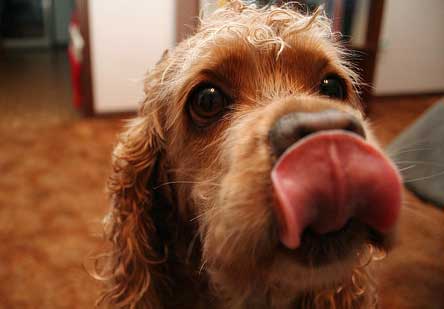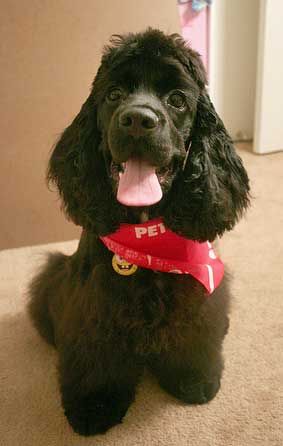- Home
- Best quality dog food
- Vegetarian dog food
Is A Vegetarian Dog Food Diet Safe?
Yes, your Cocker Spaniel can lead an active and healthy life on a vegetarian dog food diet, but it’s important to make sure that his food is balanced and meets his nutritional needs for his particular stage in life.
Learn more about vegan dog food and understand the arguments for and against vegetarian dogs.
The Vegan Dog Food Diet
There are many vegetarian owners who choose to feed their beloved pets purely on vegetables and non-meat products and whose dogs appear to thrive on it!
 Vegetarian dogs can live healthy, active lives!
Vegetarian dogs can live healthy, active lives!There
are others however, who claim their dogs simply can't extract enough nutrition
from a vegetarian diet to keep them fit and healthy.
Where the diet isn't varied enough and fails to satisfy nutritional requirements, the dog soon begins to show symptoms of malnutrition such as lethargy, a dull coat, and skin problems.
However, this is true of any sub-standard diet and not simply restricted to a vegetarian diet.
Whilst there isn't an awful lot of scientific evidence to suggest that a vegetarian diet is good news or bad news for dogs, the trend for vegan dog food is growing and vets often recommend a meat-free diet as a treatment for a severe allergy or health problem.
Overall, there appears to be arguments both for and against a vegetarian dog food diet. Let's take a look at both sides of the argument.
Arguments For Vegetarian Dogs
Those who support it claim that a 'no meat' diet can offer their pets all the nutrients they need and put forward their own healthy dogs (thriving on vegetarian food) as proof.
Poor Quality Meats And Dog Food Recalls
The vegetarian's argument against meat is a fairly strong one; mainly manufacturers' widespread use of by-products and scraps of poor quality meats.
They also point to their sometimes unscrupulous manufacturing processes (although this argument flies out of the window when applied to organic or responsibly farmed meats).
 Yummy vegetables!
Yummy vegetables!Over the past few years, there have been many recalls in the dog food industry as a result of questionable practices, which go some way to supporting their argument.
Dogs Are Omnivores
Supporters of the vegetarian diet claim that our pets have evolved (from being carnivores) to become primarily omnivores (meat and plant eaters) and that their digestive system is capable of extracting nutrients from a wide variety of sources, including grains, fruits and vegetables.
Whilst this may be true, it's essential to be certain that your dog is getting all the nutrition he needs.
Dogs Need A Well-Balanced Diet
All pets need a nutritious, balanced diet.
Foods such as eggs, soya, tofu, lentils, yoghurt, and cottage cheese, are excellent sources of vegetarian protein and, combined with fresh vegetables and brown rice or oats, can make a well-balanced vegetarian diet.
Those Against Vegetarian Dogs
Dogs Need Animal Protein
Those against a vegetarian dog food diet believe it's simply wrong.
They argue that canines were once wild animals and are carnivores 'designed' to scavenge and thrive on a meat diet. They believe dogs need to eat animal protein.
 I always eat my vegetables!
I always eat my vegetables!Whilst proteins can be found in vegetables, they're not animal proteins and claim that they're insufficient for a dog's needs.
Their view is that dogs aren't designed to process vegetables as a staple and if you need any evidence of this, they simply ask you to look at their teeth and proudly proclaim, "they're designed to rip flesh from bones!"
Amino Acids
Dogs need meat in their diet to produce vitamin D and essential amino acids. Their body can provide many of these amino acids naturally, but there are others needed that simply can't be found in a vegetarian diet and must be taken from meat.
A deficiency of amino acids can lead to heart problems and can affect the reproductive process.
Breeding And Vegetarian Dogs
A word of caution...
If you're planning to breed from your vegetarian dog, have a word with your vet about it first. He may recommend changing your Cocker's diet a few weeks before, during and after breeding.
At the very least, he may prescribe extra vitamins, minerals, amino acids and other essential supplements.
Vegetarian Dog Food: Conclusion
It seems that there are many dogs who are fed on a vegetarian diet and are living healthy, active lives, but there are those who may not fare well on a veggie diet.
It's Not For Puppies!
I wouldn't recommend feeding a puppy a vegetarian diet. I have no evidence to suggest it would be harmful; this is just my personal opinion.
I think their little bodies need all the help they can get at this early stage and until there's concrete evidence to suggest that it's okay, I'd feed them a specially prepared puppy kibble.
Vet Approved
Whilst a vegetarian diet may be adequate for humans, a vegetarian dog food
diet may not provide the complete nutrition that a dog needs, however this is easily remedied with supplements.
If you are planning to feed your dog a commercially prepared vegetarian dog food, (with all the necessary vitamins, minerals, amino acids, etc) it's probably a good idea to have your vet endorse it.
A Matter Of Personal Choice
At the end of the day, I believe it all boils down to personal choice.
I'm not an animal nutritionist, but in my opinion, the suitability of your pet's diet (vegetarian or otherwise) should be based on its ability to supply the nutritional needs of your pet.
It should also be enjoyable for your dog and easy to digest.
If you plan your Cocker's meals carefully, and monitor what he eats, I don't see any harm in a vegetarian diet, especially if your vet gives you the all clear!
Move from one diet to another slowly and gradually to avoid tummy upsets.
And in the first year of moving him onto a vegan diet, why not take him to see his vet for a check-up once every four months just to make sure he's suited to it.
Want More Info About Vegetarian Dog Food Diets?
If you'd like more detailed information about feeding your dog a vegan diet, Dr. Wendy Brown, who is head of a canine research facility at the University of New England has written a paper entitled, 'Nutritional and ethical issues regarding vegetarianism in the domestic dog'.
I think you'll find it interesting.
More Titles In The 'Healthy Dog Food' Series
If you don't agree with the vegetarian dog food diet, then I'd recommend you consider a balance of 25% protein, found in lean meats or fish, 40% fresh vegetables, and 35% carbohydrates in the form of grains such as brown rice or oats.
Those who advocate that their dogs eat meat may find the following articles interesting:
If you decide to make your own dog food, always check that your vet agrees with any changes you may make and ask him for his advice on any supplements or vitamins your dog may need.
Photo Credits: Vegetarian Dog Food
1. Bex Foreman - https://flickr.com/photos/bexforeman/36518852155
2. Ryan Johnson at Flickr.com
3. Pink Rocker at Flickr.com


